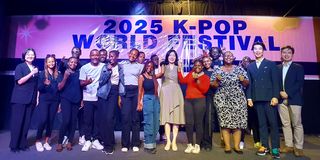Tanzania’s youth bridge cultures, eye global stage

What you need to know:
- These rising stars are the latest winners of the K-POP World Festival 2025 – Tanzanian Chapter, held at the Little Theatre Club in Dar es Salaam on June 23, 2025. They now have their sights set on Seoul this November for the global finals
Dar es Salaam. A group of talented Tanzanian youth are preparing to showcase their dancing and singing skills to the world—this time, in Korean.
They are the latest winners of the K-POP World Festival 2025 – Tanzanian Chapter, held at the Little Theatre Club in Dar es Salaam on June 23, 2025 with hopes of making it to Seoul this November for the global finals.
But this celebration of Korean culture is not a one-sided cultural export.
It is unfolding at a time when Tanzania is itself rising to champion its cultural heritage globally, marking a profound shift in mutual cultural diplomacy between the two countries.
“K-POP is not just music—it’s a platform for young people to connect, understand, and respect cultural diversity,” said the Deputy Chief of Mission at the Korean Embassy in Tanzania, Mr Seungyun Lee at the event.
“Through events like these, we’re building people-to-people ties between Seoul and Dar es Salaam.”
The event, part of Korean Cultural Week, featured dozens of young Tanzanians performing Korean pop songs and dances, many in fluent Korean.
The finalists will now compete online with other global winners for a chance to represent Tanzania in South Korea.
“Every year, we see more talent. Tanzanian youth are not just learning Korean songs—they’re embracing the values and discipline that come with K-POP culture,” Mr Lee added.
Rahma Masele, 20, beamed with confidence after winning the dance category.
“Now it’s time to take Tanzanian culture to Korea too. I’ll keep practicing until I make it to Seoul. This is more than a performance—it's a bridge between two worlds,” she said.
Giveness Katale, 24, who impressed the judges in the singing category, shared similar hopes:
“This is Tanzania’s year. We’re going to win. We want the world to see our talent, our story.”
Such youthful enthusiasm speaks volumes about how cultural initiatives like K-POP are transcending entertainment, shaping global perceptions, and fostering friendship among nations.
The K-POP World Festival, first launched in 2011 by South Korea’s ministry of Foreign Affairs and KBS World TV, is part of a broader strategy known as the “Hallyu” (Korean Wave)—a global movement to promote Korean culture, from music and food to fashion and cinema.
The impact is evident: Korean dramas are now dubbed in Kiswahili, and K-POP groups have Tanzanian fanbases with tens of thousands of followers online.
Tanzania’s cultural renaissance
Interestingly, while Tanzanian youths dance to Korean beats, their own country is undergoing a cultural revival of its own.
Just the same week before the K-POP event, President Samia Suluhu Hassan led a cultural celebration in Mwanza, urging traditional leaders and citizens to preserve and promote Tanzanian traditions, including language, rituals, and music.
“Culture is the soul of our identity,” she declared. “We must protect our values and pass them on. Our culture even guides how we choose our leaders.”
During the same event, Minister of Culture, Arts and Sports, Prof Palamagamba Kabudi, announced bold steps to elevate Tanzanian culture to international standards:
He said of a proposal to UNESCO for Bulabo Festival to be recognised as a global cultural heritage and a National Cultural Atlas will be launched to document and preserve local languages.
“An annual national cultural festival will be held, rotating across regions—starting in Lindi this December,” he said. “Our indigenous languages and traditions are under threat. We must protect and document them—this is our future,” Prof Kabudi stressed.
As Tanzanian youths dance their way into Seoul’s spotlight, and as chiefs in Mwanza prepare for a national cultural festival in Lindi, one thing is clear: Culture is now a strategic national asset.
“It’s not about whose culture is better,” said Rahma Masele, the young K-POP dancer. “It’s about sharing what makes us unique—and learning from each other.”





